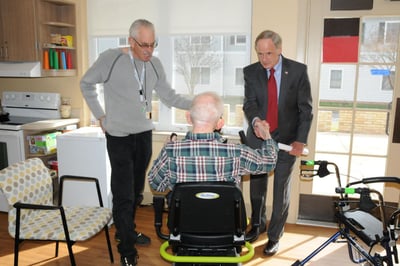 At Presbyterian Senior Living, we feel strongly that senior communities should use proactive and personalized approaches to provide the best possible care to their residents. A visit by a U.S. senator recently highlighted the commitment of one of our communities, Westminster Village in Dover, to reducing unnecessary prescriptions of antipsychotic drugs and enhancing the quality of life for seniors.
At Presbyterian Senior Living, we feel strongly that senior communities should use proactive and personalized approaches to provide the best possible care to their residents. A visit by a U.S. senator recently highlighted the commitment of one of our communities, Westminster Village in Dover, to reducing unnecessary prescriptions of antipsychotic drugs and enhancing the quality of life for seniors.
A Serious Concern for Seniors’ Health
Westminster Village in Dover uses forward-thinking, individualized strategies for providing the highest-quality care. Across the nation, however, the use of mind-altering antipsychotic medicines is posing a serious health concern for seniors.
Following his recent visit to Westminster Village in Dover, Sen. Tom Carper of Delaware noted that across the United States, 17 percent of long-term nursing home residents who have symptoms of dementia are prescribed antipsychotic medications. While such drugs can help with certain medical conditions, Carper wrote, experts do not recommend their use for treatment of dementia.
According to AARP, as many as one in five nursing home patients — among more than 15,000 patients across the country — are unnecessarily prescribed antipsychotic drugs, primarily because of under-staffing and poor training. Aggressive marketing by pharmaceutical companies also bears partial responsibility for the widespread use of the medications, which can be extremely dangerous for seniors.
In 2015, Sen. Carper requested a Government Accountability Office report that found that many antipsychotic medications carry specific warnings not to administer them to dementia patients. In addition, the report stated that the Food and Drug Administration has not approved prescribing the drugs to dementia patients. Thanks to efforts by Medicaid, Medicare and local providers of senior health care services, however, the number of seniors receiving the drugs inappropriately is decreasing.
Reducing Inappropriate Prescriptions
 During his visit to Westminster Village in Dover earlier this year, Senator Carper learned more about the community’s efforts to reduce unwarranted prescriptions of antipsychotic medications and to enhance the quality of life of residents.
During his visit to Westminster Village in Dover earlier this year, Senator Carper learned more about the community’s efforts to reduce unwarranted prescriptions of antipsychotic medications and to enhance the quality of life of residents.
Westminster Village is leading the effort to restrict improper prescriptions of such drugs, he noted, and staff members work closely with physicians to find alternative options for treatment. Sen. Carper wrote that staff members engage with residents, residents’ loved ones and medical professionals to identify “individualized treatments” that improve quality of life. He also pointed out that no residents at Westminster Village are taking antipsychotic medications.
Sen. Carper visited Westminster Village along with Rita Landgraf, Delaware’s Secretary of Health and Human Services, to see firsthand “this shift from relying on mind-altering drugs” to treat seniors. He added that residents he talked with were engaged and active, enjoying activities like yoga and dance classes.
A Better Way to Care for Seniors
An increasing number of senior communities are seeking better methods for providing care, including improving training. At Presbyterian Senior Living, our mission is serving seniors with dignity, respect and compassion. Working to eliminate the unnecessary use of antipsychotic medications is just one way our dedicated staff members strive to fulfill our mission every day.
